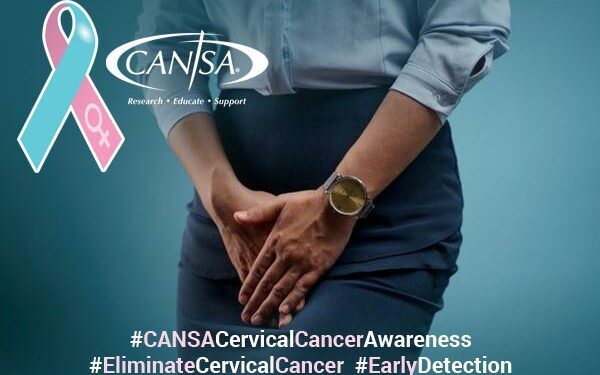Cervical cancer is mainly caused by the Human Papilloma Virus (HPV), a common virus spread through skin-to-skin contact, body fluids and sexual intercourse.
HPV infections do not always result in cervical cancer, and most women will have an HPV infection in their lifetime.
There are many types of HPV and some of the virus types can infect the cells that could lead to cancer. About 40 types are sexually transmitted through genital contact, while mostly two types (16 + 18) are considered high risk in South Africa.
High risk HPV is estimated to cause: 70% of cervical cancers; 50% of vaginal & vulvar cancers; and 20% of head & neck cancers.
Elize Joubert, CANSA CEO:
“CANSA is dedicated to educating women about one of the most preventable cancers. In Africa, cervical cancer is the cancer women die of most. This should not occur where vaccination against Human Papilloma Virus (HPV) and cancer screening are implemented correctly.”
CANSA aims to educate more women about cervical cancer and we’re excited to introduce a video promoting the importance of Pap smears and educational radio spots. The radio spots are available in isiXhosa, isiZulu, Sesotho, English and Afrikaans, so we’re delighted to be reaching a wider audience of women. CANSA is thankful to Siemens Healthineers for sponsoring the cost of the radio spots and video to raise cervical cancer awareness. Our cervical cancer infographic, has also been translated into isiXhosa and Sesotho recently and is also available in Afrikaans.
Can I Prevent It?
Although there is no guarantee of preventing a cervical cancer diagnosis, certain actions and lifestyle changes can certainly lower your cancer risk:
Lower cancer risk – being overweight, inactive, consuming alcohol, poor dietary habits, smoking and exposure to chemicals increases risk. It is important to lead a balanced, active lifestyle. Failure to use protection during sexual intercourse, sexually transmitted infections (STIs), multiple sexual partners, early sexual debut, and use of oral contraceptives also increases risk.
Vaccinate – allow young girls 9 to 12 years old to be immunised with the Human Papillomavirus (HPV) vaccine through the Department of Education’s HPV Vaccination Programme and if you are under 28 years old and have not received the vaccination at school, go to your local pharmacy to request a vaccination, preferably before you have been sexually active.
Cancer screening – We encourage women aged 18 to 69 to contact a CANSA Care Centre to book a Pap smear or visit their local clinic or health professional. As part of our screening programme, CANSA makes use of the trusted and clinically proven liquid-based cytology method when collecting a sample during a Pap smear. Pap smears help us identify abnormal cells on the cervix (lower womb) caused by HPV which can lead to cancer. Should the result indicate an abnormality, CANSA can help with a referral within the public health care sector or to a medical practitioner. If you are not sure how a Pap smear is performed.
According to the National Department of Health’s Cervical Cancer Prevention and Control Policy women aged 30 years and older can have three Pap smears in their lifetime at 30, 40 and 50 at public health clinics at no cost (non-symptomatic). If women experience abnormal symptoms, they can request a Pap smear at local government clinics. HIV positive women are eligible for a Pap smear at diagnosis and every three years thereafter if negative for cervical cancer (yearly if screening is positive).
Follow up results screening – If you’re screened for cervical cancer, please go back to the facility after six weeks for your results.
Don’t avoid treatment – Cervical cancer is highly treatable if caught in the early stages and treatment should start as soon as possible for best results.
Do I Have Cervical Cancer?
It’s very important that women are aware of the changes that happen in their bodies, and that they not be fearful or ashamed of sharing this with a medical professional.
If you’re having heavy, prolonged bleeding heavier than your normal period, or if you have a foul smell coming from your vagina, please visit your nearest health facility. Other symptoms include abnormal bleeding between periods, vaginal discharge, vaginal bleeding or pain during intercourse / after menopause, and increased urinary frequency.
I’m HIV positive. Does that matter?
Women with human immunodeficiency virus (HIV) infection have a higher risk of developing cervical cancer at an earlier age. If you’re diagnosed with HIV, you should screen for cervical cancer every three years irrespective of your age.
HIV positive women are eligible for a Pap smear at diagnosis and every three years thereafter if negative for cervical cancer (yearly if screening is positive) at public health clinics.










